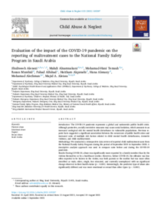Introduction:
The COVID-19 pandemic represents a global and nationwide public health crisis. Although protective, socially restrictive measures may cause social isolation, which amounts to an increased ecological risk for mental health disturbance in vulnerable populations. Previous re-ports have suggested a significant association between the occurrence of public health crises and increased rates of multiple risk factors related to child mental health disturbances, domestic violence, and child-maltreatment.
Methodology:
We conducted a retrospective data review of reported child maltreatment cases from the National Family Safety Program during the period of September 2019 to September 2020. A descriptive analysis approach was used to compare rates before and during the COVID-19 pandemic.
Results:
During COVID-19, abuse was significantly more reported by a family member than by the victims themselves or by a healthcare worker. However, before COVID-19, the offender was less often reported to be known to the victim; was both parents or the mother but was more often described as male, older, single, less educated; and currently unemployed with no significant change observed in their health status (p <0.001). Interestingly, the predicted type of abuse also significantly differed and was more emotional or sexual than other types (p <0.001).

